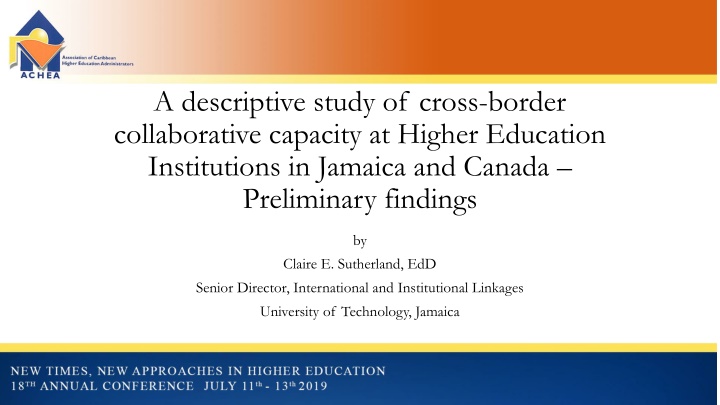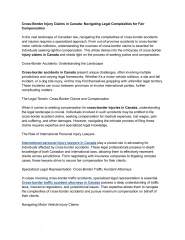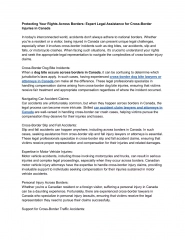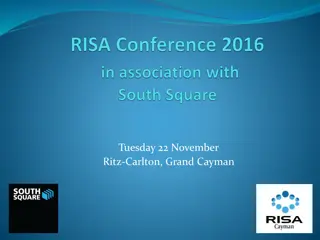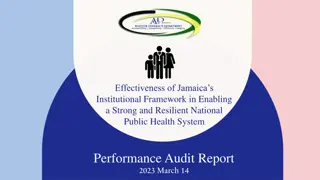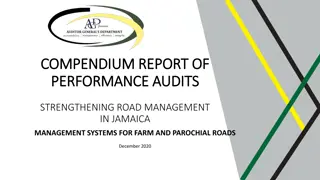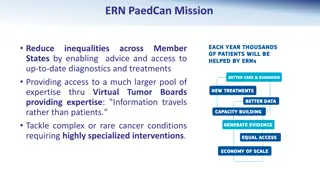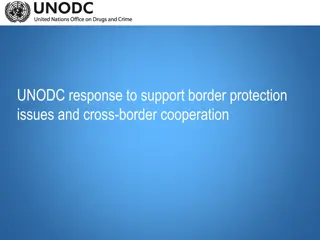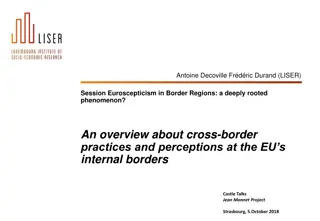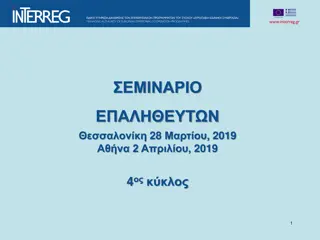Cross-Border Collaborative Capacity in Higher Education: Jamaica and Canada
A preliminary study by Claire E. Sutherland explores the nature of cross-border collaboration capacity in higher education institutions in Jamaica and Canada. The research, ongoing since 2019, delves into the processes and activities facilitating cross-border higher education between the two countries, aiming to enhance understanding and inform future research and policy development.
Download Presentation

Please find below an Image/Link to download the presentation.
The content on the website is provided AS IS for your information and personal use only. It may not be sold, licensed, or shared on other websites without obtaining consent from the author.If you encounter any issues during the download, it is possible that the publisher has removed the file from their server.
You are allowed to download the files provided on this website for personal or commercial use, subject to the condition that they are used lawfully. All files are the property of their respective owners.
The content on the website is provided AS IS for your information and personal use only. It may not be sold, licensed, or shared on other websites without obtaining consent from the author.
E N D
Presentation Transcript
A descriptive study of cross-border collaborative capacity at Higher Education Institutions in Jamaica and Canada Preliminary findings by Claire E. Sutherland, EdD Senior Director, International and Institutional Linkages University of Technology, Jamaica
This is On-going Research Research ethics approval received from University of Technology, Jamaica in April, 2019, and Brandon University, Canada in June, 2019. The preliminary findings presented are regarding data collected during the month of May, 2019. The larger study to be implemented beginning in Academic Year 2019/2020 funding will be required. Claire E. Sutherland, EdD, ACHEA 18th Annual Conference, Negril, Jamaica, July 12, 2019 2
Research Question What is the nature of cross-border collaboration (CBC) capacity in higher education (HE) between Jamaica and Canada? Claire E. Sutherland, EdD, ACHEA 18th Annual Conference, Negril, Jamaica, July 12, 2019 3
Definitions Higher education institutions (HEIs) post-secondary or tertiary level providers of college or university education leading to a degree. Cross-border collaboration (CBC) refers to processes and activities between two or more HEIs located in different national jurisdictions, which enable mutually agreed commercial or non-commercial cross-border higher education (CBHE) transnational education (TNE), offshore, borderless. CBC capacity is defined as ability, preparedness, and readiness to produce and participate effectively in CBC. Claire E. Sutherland, EdD, ACHEA 18th Annual Conference, Negril, Jamaica, July 12, 2019 4
Outline 1. Preamble 2. Research Question 3. Introduction 4. Conceptual Framework 5. Review of Literature 6. Method 7. Preliminary Findings 8. Discussion 5 Claire E. Sutherland, EdD, ACHEA 18th Annual Conference, Negril, Jamaica, July 12, 2019
Introduction - Background Globalisation opportunities and tensions for developing countries (see Stiglitz, 2002 and Bhagwati, 2004 for both sides of the debate). Continues to influence geo-political world trade discussions General Agreement in Trade in Services (GATS) and Trade-Related Aspects of Intellectual Property Rights (TRIPS) Jamaica and Canada long history of bilateral relations. Asymmetries - 2017 KOF Globalisation Index Canada ranked 11th in the world with score of 85.61, and Jamaica ranked 85th with score of 58.43. Under-researched area. Knowledge of the current situation can guide policy, planning, capacity- building, and future research directions. Claire E. Sutherland, EdD, ACHEA 18th Annual Conference, Negril, Jamaica, July 12, 2019 6
Introduction - Objective To describe the current situation regarding cross-border collaboration (CBC) capacity in HE between Jamaica and Canada. Claire E. Sutherland, EdD, ACHEA 18th Annual Conference, Negril, Jamaica, July 12, 2019 7
Introduction - Purpose To determine the perceptions and opinions of HE administrators and professionals in Jamaica and Canada on aspects of their organisation s preparedness for successful participation cross-border collaboration in HE between Jamaica and Canada. Claire E. Sutherland, EdD, ACHEA 18th Annual Conference, Negril, Jamaica, July 12, 2019 8
Introduction - My Interest in the Research Questions Integrate scholarship professional practice in international development with research on collaboration and border studies pertaining to higher education. 9 Claire E. Sutherland, EdD, ACHEA 18th Annual Conference, Negril, Jamaica, July 12, 2019
Conceptual Framework (a) The concept of borders, a dividing line between countries and jurisdictions, and border crossings as an avenue for seeking betterment and fulfilment. (b) Collaborative working, a necessity for achieving successful higher education partnerships. Claire E. Sutherland, EdD, ACHEA 18th Annual Conference, Negril, Jamaica, July 12, 2019 10
Review of Literature Borders complex social institutions which are dividing line for societies, nations, states, cultural realms determining the boundaries of nationality, citizenship, power, human agency, human experience, and concepts of identity (Passi, 2013). Types political, symbolic, open. Characteristics geographic, spatial, asymmetries, selective openness, inward-oriented, territoriality, othering, inclusion and exclusion, hard, soft, obstacles to mobility, diffuse, emotional landscapes of control (p.23). Border crossings considered the right to cross borders, to change one s place and to seek opportunities for better elsewhere (Passi, 2013. p.20) the essence of mobility. Border crossings require collaboration, negotiation, transaction, and agreement by authorities and parties on either side of the border. It is an essential means for HEIs to participate in globalisation and cross-border higher education (CBHE). Claire E. Sutherland, EdD, ACHEA 18th Annual Conference, Negril, Jamaica, July 12, 2019 11
Review of Literature contd Collaborative working Rosabeth Moss Kanter (1994) explores collaborative advantage. Active collaboration requires the establishment of structures, processes, and skills (p.105). The most productive collaborations achieve five levels of integration (p.105) strategic, tactical, operational, interpersonal, and cultural. Involves unique challenges - new skills, mindsets and thinking are needed by managers for success in cross-border collaboration ventures which involve extreme teaming (coined by Jean-Francois Harvey) and most vital support of technology (Amy Edmondson, interviewed by Frieda Klotz, December 22, 2017 in MIT Sloan Management Review). Claire E. Sutherland, EdD, ACHEA 18th Annual Conference, Negril, Jamaica, July 12, 2019 12
Method A descriptive design using an electronic survey was considered to be appropriate economy and turnaround time to investigate this topic which has not previously been researched. A sample of higher education professionals and academics in Jamaica and Canada whose work involved or supported CBC in higher education between Jamaica and Canada, was conveniently selected. Participants were recruited via email invitation to participate. An e-questionnaire was used to collect data from participants using SurveyMonkey. This instrument consisted of 26 closed and open- ended questions. 13 Claire E. Sutherland, EdD, ACHEA 18th Annual Conference, Negril, Jamaica, July 12, 2019
Some Preliminary Findings Claire E. Sutherland, EdD, ACHEA 18th Annual Conference, Negril, Jamaica, July 12, 2019 14
Country and type of work institution of participants 96% of respondents reported that the institution in which they worked was involved in CBC in HE between Jamaica and Canada. 32% of respondents worked in institutions in Canada 68% worked in institutions in Jamaica. 88% worked at a university 4% worked at a college 4% worked at an educational-based social enterprise, and 4% worked at a Federal Department of Government. Claire E. Sutherland, EdD, ACHEA 18th Annual Conference, Negril, Jamaica, July 12, 2019 15
Job Roles of Participants Job Role of Respondents by Percent 12 12 8 20 4 12 32 President International Director Dean Academic Management Other Administrator Lecturer Other Claire E. Sutherland, EdD, ACHEA 18th Annual Conference, Negril, Jamaica, July 12, 2019 16
Other Job Roles of Participants Professor Project coordinator: Consultant Strategic Academic and Business Relations and Partnerships Claire E. Sutherland, EdD, ACHEA 18th Annual Conference, Negril, Jamaica, July 12, 2019 17
Dedicated office for CBC 68% of participants said their institutions had a single office dedicated to CBC 48% of participants worked in such dedicated offices at their HEI. Other responses included There are multiple offices, one on each campus and also an office at the Centre ; One dedicated office for education with sub-sector responsibilities , and; There is a Senior Director within the Office of the President of the University . Claire E. Sutherland, EdD, ACHEA 18th Annual Conference, Negril, Jamaica, July 12, 2019 18
Participants Job responsibilities in CBC Never had job responsibilities in cross-border- collaboration at my HEI 20% Had job responsibilities in CBC at my HEI - 80% One month to five years - 52% 6 to 10 years 8% 10 years and over 20% Claire E. Sutherland, EdD, ACHEA 18th Annual Conference, Negril, Jamaica, July 12, 2019 19
Main Job functions of Participants in CBC My main job function(s) in CBC in HE Other Student mobility Faculty mobility Job function Recruiting international students Managing collaborative research Establishing cross-border collaboration agreements 0 5 10 15 20 25 30 35 40 45 50 Percent Claire E. Sutherland, EdD, ACHEA 18th Annual Conference, Negril, Jamaica, July 12, 2019 20
Other stated Job Functions in CBC in HE Exchange students - credit transfers and curriculum issues International Study Group Tours Cross border (CB) collaborative programming; executing CB agreements; general management of the University, including CB collaboration; CB staffing Student Accommodation Alumni relations Lecturer, and; student supervision Claire E. Sutherland, EdD, ACHEA 18th Annual Conference, Negril, Jamaica, July 12, 2019 21
Estimated number of HEI Linkages in Jamaica/Canada Estimated number of HEIs with which my institution has CBC activities in Jamaica/Canada 80.00% 70.00% 60.00% 50.00% Axis Title 40.00% Responses 30.00% 20.00% 10.00% 0.00% 1 to 5 6 to 10 11 to 15 16 to 20 over 20 Axis Title Claire E. Sutherland, EdD, ACHEA 18th Annual Conference, Negril, Jamaica, July 12, 2019 22
Diversity of HE CBC Activities by Geographic Region 100% Geographic regions in which HEIs have CBC in HE besides Jamaica/Canada 80 70 60 50 Percent 40 30 20 10 0 North America Caribbean Europe Asia South America Africa Central America Oceana Geographic region Claire E. Sutherland, EdD, ACHEA 18th Annual Conference, Negril, Jamaica, July 12, 2019 23
Most Important CBC Enablers at my Institution Most important enablers at my HEI 16 12 68 52 28 60 Competent staff Collaboration agreements with education institutions abroad Close knowledge of education institutions abroad International education networks Agents Other 24 Claire E. Sutherland, EdD, ACHEA 18th Annual Conference, Negril, Jamaica, July 12, 2019
Other Important Enablers at my Institution- Themes Funding On going stream lined communication Succession plan for continuation Supportive leadership Collaborative exchange of course accreditation information to allow for successful conclusions of agreements. 25 Claire E. Sutherland, EdD, ACHEA 18th Annual Conference, Negril, Jamaica, July 12, 2019
Most Important CBC Hindrances at my Institution Most Important CBC Hindrances at my Institution in Percent 60 54 50 40 33 Percent 29 29 30 21 20 13 10 0 Shortage of competent staff Few Collaboration agreements with education institutions abroad Limited knowledge of education institutions abroad Limited International education networks Need institutional agents abroad Other Most Important Hindrances Claire E. Sutherland, EdD, ACHEA 18th Annual Conference, Negril, Jamaica, July 12, 2019 26
Other Important hindrances at my Institution- Themes Lack of institutional commitment; no prioritization of internationalization as a strategic initiative. Limited funding and financial support for international collaborations for both parties Need resources to dedicate to CBC - faculty busy teaching or undertaking administrative work Lack of communication No synergies between research interests of faculty with that of students Lack of awareness of institutions CBC agreements Limited traction of some CBC agreements Realistic relationships and goals need to be forged, with attention to asymmetries in the relationships. For instance, can the University give as much as it gets, and vice versa? 27 Claire E. Sutherland, EdD, ACHEA 18th Annual Conference, Negril, Jamaica, July 12, 2019
Personnel at overseas (Canada/Jamaica) Institutions with which Communicate most regarding CBC activities in HE Personnel Communicate with the Most at Overseas Institutions re CBC in HE Jamaica and Canada Other 0 None 4 Education Consultants 4 We rely on agents 0 We rely on private recruiters 0 Personnel Admission staff 0 Administrators 36 Heads of Schools 32 members of faculty 36 Dean 40 International Director 56 President 12 0 10 20 30 40 50 60 Percent Claire E. Sutherland, EdD, ACHEA 18th Annual Conference, Negril, Jamaica, July 12, 2019 28
Outcomes of Institutions CBC activities in HE between Jamaica/Canada Outcomes of CBC activities Jamaica/Canada Establishment of an Institute Cooperative education External examiners Joint or dual degrees CBC Outcomes Co-teaching Scholarships Technology transfer New courses or programs of study Collaborative research Faculty/staff mobility Student mobility 0 10 20 30 40 50 60 70 80 Percent 29 Claire E. Sutherland, EdD, ACHEA 18th Annual Conference, Negril, Jamaica, July 12, 2019
How institution's capacity for cross-border collaborative capacity be enhanced Research grants to facilitate collaborative research Having a fully staffed office for the function More inclusion, and advertisement Campus visits Enhancing number of staff in International Office dedicated to cross-border (c-b) initiatives Improve knowledge of options in all faculties More competent staff Co-teaching Financing of students Continuing to strengthen network with ability to leverage experience, insights and contextual momentum Deliberate budgeting for time and resources Ongoing collaborative meetings Increase in on campus housing More interaction Scholarships Stronger implementation of MOUs Need a dedicated department fully staffed Improve Marketing Innovative and real-time research activities Scholarships and Grants to facilitate faculty mobility Joint research An expanded network internationally Increased budget Active recruitment of students from overseas for under subscribed programmes Claire E. Sutherland, EdD, ACHEA 18th Annual Conference, Negril, Jamaica, July 12, 2019 30
Top five things which could improve cross-border collaboration among higher education institutions in Canada and the Caribbean - Excerpt Faculty interaction greater awareness of interests at other universities greater knowledge on both sides Increased strategic linkages Strategic planning Involvement of more educational Institutions Belief in the benefits from top management Easier access to collaborating Institutions Leadership funding Better communication from recipient institutions Open mindedness Reduction in crime and violence Complementary goals and programmes Strong articulation of the benefits Culture sharing Mentors and guides to assist applicants Claire E. Sutherland, EdD, ACHEA 18th Annual Conference, Negril, Jamaica, July 12, 2019 31
Discussion General: The preliminary findings suggest that CBC in HE between Jamaica and Canada could be primarily of a non-commercial nature. Four key elements of CBC in HE at institutions involved in CBC between Jamaica and Canada organisation culture, networks, some key stakeholders- students, faculty, international directors, academic innovation and collaborative research. CBC in HE activities of the HEIs do not appear to be only focussed of CBC between Jamaica/Canada. Participants identified more important hindrances than important enablers. International Directors and faculty at the most frequent communication nodes at institutions overseas. Student and faculty mobility are the most frequent outcomes of CBC in HE Jamaica and Canada. 32
Discussion contd No generalizations can be/are intended to be made from the preliminary findings. Research design is feasible enough for resources to be spent on the larger study for which research funding will be required. Completion percent of instrument was approximately 100%. Rate of recruitment of participants was slow/low, suggesting that a longer time will be needed for data collection in the larger study, and time of year for data collection to be considered. Strategies regarding reach of potential participants to be enhanced, especially regarding electronic transmission. Confidentiality of identity of participants with survey responses was achieved. The protocols fit for purpose and can be repeated. However, some adjustment will be needed to the instrument further explore themes identified in the preliminary phase, and for comparative study. Claire E. Sutherland, EdD, ACHEA 18th Annual Conference, Negril, Jamaica, July 12, 2019 33
Summary key elements of CBC capacity in HE Jamaica and Canada Organization culture Strategy/institutional commitment/interest Resources Staffing Financial resources Research grants and opportunities Implementation Communication Marketing Partnership-building (internal and external) Networks Some key stakeholders students, faculty, international directors Academic innovation and collaborative research. Claire E. Sutherland, EdD, ACHEA 18th Annual Conference, Negril, Jamaica, July 12, 2019 34
Questions? Claire E. Sutherland, EdD, ACHEA 18th Annual Conference, Negril, Jamaica, July 12, 2019 35
